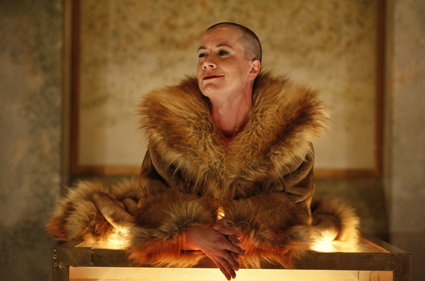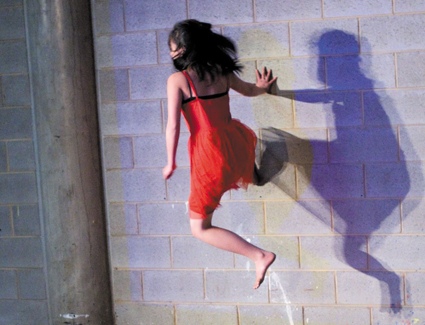Academy & industry hand in hand
Keith Gallasch: Interview, Jane Montgomery Griffiths, Centre for Theatre and Performance, Monash University

Jane Montgomery Griffiths, Sappho…in 9 Fragments, Malthouse
photo Jeff Busby
Jane Montgomery Griffiths, Sappho…in 9 Fragments, Malthouse
Jane Montgomery Griffiths is a widely experienced, practising actor, a performer of her own work (Sappho…in 9 fragments) and director of plays who writes on acting and is currently editing a volume on space and time in Greek drama. She’s also Head of Section at Monash University’s Centre for Theatre and Performance (CTP), with ambitions to create an enduring bridge between the academy and the theatre world.
I see that the Centre for Theatre and Performance is relatively independent within the university structure.
Yes, we are our own autonomous centre now—no longer part of a school.
That’s almost pre-Dawkins. Presumably with quite a measure of independence?
We have a lot. Obviously we report to the faculty but it is nice to be able to steer the curriculum the way we feel it should be going in the current cultural climate. Since going autonomous, we’ve had a lot of changes over the last 18 months, given university restructuring, but I think we’ve come out the other side; it’s an exciting time for CTP now.
What makes it special, do you think?
We had an independent Bachelor of Performing Arts degree, which was very successful and we had a lot of people applying for it, but because of university restructuring that was disestablished last year. What we have instead is a very vibrant suite of units nestled under the university BA. We have a Theatre Major, which is theoretical with a lot of practical application. We’re also developing a very cutting-edge Performance Minor, which will be investigating—with a lot of industry focus and industry connection—ways of making theatre in the current cultural climate.
The most exciting initiative is that we’re just about to sign a partnership as the major sponsor of Malthouse Theatre. That’s going to make a big difference because it means that our Performance Minor students have access to internships at Malthouse [in] a cultural conversation between Malthouse as a theatre that likes to see itself as an engine for change and us as a department that wants to really explore what the parameters of performance are, not just in the Australian context but globally. This will come into effect from 2015 and it’s really going to bolster the potential for us to engage in the community in a way that perhaps doesn’t often happen in a university context.
And as Head of Department I’m a professional practitioner as well as doing my research and teaching; I’m still out there doing shows. We have a huge number of industry engagements. In our Theatre Major units we have pretty much the best of the best independent theatre-makers coming in to teach. We’re trying to look at both the theory of performance but also the industry practicalities in a way that’s intellectually and theoretically rigorous and also practically very engaged. That’s a big change because we didn’t have the opportunity to do this before.
And how much weight will the Performance Minor actually have in the BA? How much can a student commit to that stream?
Every unit is six points and a traditional major is 48 points and our Performance Minor is 24 points. Everybody will commence the Theatre Major and then those who discover that they really have a passion for the Performance as Research—investigations through practice—can also take the Performance Minor. In effect they have the same suite of educational outcomes as they did in the old Bachelor of Performing Arts but the difference is that they’re now coming in to the Performance Minor really knowing what they want to do and where they want to go. It’s very much honed and targeted as very specific education and training for students who really want to take that next step and go into professional practice.
Do they audition to move to Performance Minor?
No, it’s not an audition. Anybody who has completed the first year of the Theatre Major is welcome to apply for the Performance Minor. I think auditioning has historically put too much weighting on the ability to act. I want to validate people who want to be dramaturgs, stage managers, directors and lighting designers. I trust the students well enough to know that they will only do the Minor if they really want to pursue this and if they’re really passionate.

Centre for Theatre and Performance, student
photo David Sheehy
Centre for Theatre and Performance, student
And what about the forms of performance engaged in within your courses?
I think it’s really important that we validate all forms of theatre. We give the students a theoretical and also a practical understanding of everything from very traditional forms of theatre right through to the most avant-garde. For instance, our most popular unit is still on Shakespeare in Performance and I love that. But I also love it, because of the range of teaching staff we have. Students don’t just learn how to speak in iambic pentameter and read John Barton, they also learn how to deconstruct a text. I actually think historically one of the biggest failings that we’ve had is that we’ve put so much weighting on avant-garde experimental performance forgetting that students actually need to learn the nuts and bolts before they can become experimental. So we’re offering units that will give them a real grounding so they know what they’re experimenting from. They know that people were there before them. If they are re-inventing the wheel, at least they’ll know they’re doing it.
What are the possibilities as students are completing the course—do they have Honours and Post-Graduate options?
Our Honours is popular and the university has the largest post-graduate department in the country. What’s attractive for early and especially mid-career practitioners coming back to academia is that we have Practice Research PhDs and Masters. With Practice Research degrees there has been a rather prejudicial view that it’s taking the soft option. You know, instead of writing a 100,000-word thesis, you make a work and you write an exegesis. Honest to God, I think if you’re applying practice research rigorously, it’s so much harder to do that than to write a thesis.
What’s terrific is when the post-grads and the undergrads interact as they did last year when [autobiographical, queer performer] Tim Miller came over from the US to do a residency with us. That was fantastic because a range of experiences and academic backgrounds came together to create a collaborative piece. That’s what we’re aiming for—to create a real cohort from first year undergraduates right the way up to final year PhD students.
One of my briefs, as well, is to bring in practitioners to give free workshops to early and emerging career artists. So we’ve brought over Robin Arthur from Forced Entertainment. He’s giving a week of free workshops to about 15 or so of the independent theatre-makers from outside the university. CTP and the Monash Academy are sponsoring it. And it’s part of our brief to say, in a way, universities need to be the new patrons of the arts. If we have the funding to help emerging artists and companies develop, then we need to do that.
What topics are postgraduates tackling?
A huge variety! A BodyWeather artist investigating the phenomenology of the body in site-specific performance. A Sri Lankan director re-interpreting ancient forms of Sri Lankan tragedy for a contemporary Sri Lankan-Melbournian audience. A director looking at film/stage adaptation and a well-known artist working on how you can portray ‘Strine’ and Australian patriotism through musical theatre. It’s a very broad church that we have.
And who are some of your staff members and sessional teachers?
On the staff we have Dr Stuart Grant who is a phenomenologist and also the lead singer in a punk/noise band [The Primitive Calculators]—Andrew Bolt got wind of this earlier this year and Bolted him. There’s Felix Nobis who’s a professional actor and award-winning poet who also wrote the very well received play Boy out of the Country, which was on at 45 Downstairs last year. Fiona Gregory is a Shakespeare and Ibsen scholar. And in terms of sessionals, last year teaching directing we had Adena Jacobs, Nadia Tass, Pamela Rabe and Daniel Schlusser. This coming semester we have Emma Valente [The Rabble], Nicola Gunn, Matt Bebbington and Angus Cerini.
How are you going with the overlapping careers?
It’s a bit bonkers to be honest. It depends what you’re doing. When I’m writing a play that’s okay, but for instance, doing something like performing in The Rabble’s Frankenstein, I just adore The Rabble and love working with them, but it doesn’t ‘arf take it out of you physically! Doing a full day at Monash and then going off to be a naked monster with 29 bosoms at night was a bit tricky.
I’m a jobbing actress who happens to be an academic too but I do genuinely think that with the vision to try to make CTP into a place of engagement, not just for our students but also with the independent theatre community—also the mainstream stages such as Malthouse—then we’re not just surviving but we’re going to thrive and be a really innovative and exciting centre.
Centre for Theatre and Performance, Monash University, Clayton Campus, Melbourne
RealTime issue #122 Aug-Sept 2014 pg. 12






